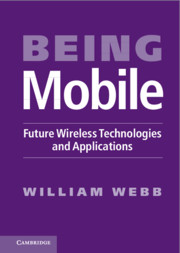Book contents
- Frontmatter
- Contents
- About the author
- List of abbreviations
- 1 Introduction
- Part I Technologies
- 2 4G cellular
- 3 Femtocells
- 4 Cells in the sky
- 5 Mesh networks
- 6 Software-defined radios and new receiver architectures
- 7 Cognitive or white-space systems
- 8 Codecs and compression
- 9 Devices
- 10 Network architectures
- 11 The green agenda
- Part II Solutions
- 12 The future of users
- 13 Sensors
- 14 Social communications
- 15 Location
- 16 Healthcare
- 17 Transport
- 18 Entertainment
- 19 The smart grid
- 20 Assisted living
- 21 Universal service
- 22 Summary
- Index
- References
7 - Cognitive or white-space systems
from Part I - Technologies
Published online by Cambridge University Press: 05 October 2013
- Frontmatter
- Contents
- About the author
- List of abbreviations
- 1 Introduction
- Part I Technologies
- 2 4G cellular
- 3 Femtocells
- 4 Cells in the sky
- 5 Mesh networks
- 6 Software-defined radios and new receiver architectures
- 7 Cognitive or white-space systems
- 8 Codecs and compression
- 9 Devices
- 10 Network architectures
- 11 The green agenda
- Part II Solutions
- 12 The future of users
- 13 Sensors
- 14 Social communications
- 15 Location
- 16 Healthcare
- 17 Transport
- 18 Entertainment
- 19 The smart grid
- 20 Assisted living
- 21 Universal service
- 22 Summary
- Index
- References
Summary
Unlicensed spectrum is becoming more valuable but more congested
When Ofcom last looked at the value that a country derives from its use of spectrum in 2007, it concluded that unlicensed use delivered only about 1% of the overall value. This was a backwards-looking survey that was based on evidence from previous years. To come to these conclusions, the survey assumed that the main value in unlicensed use was WiFi and that this added value by enabling home owners to avoid wiring their home. At the time and looking at the evidence available for earlier years, this may have been a reasonable characterisation. It led to the overall assessment that spectrum managers should concentrate on licensed bands, where the overwhelming value of the spectrum was to be found.
Since that time much has changed. WiFi has become more than just a wire-replacement technology. It is slowly becoming a core part of our communications network, used by many on a daily basis to improve productivity and access network resources in a range of locations. It is increasingly used by cellular operators as a means of offloading data traffic, to the extent that in a few years time a widespread failure of WiFi networks could result in serious congestion on cellular networks. WiFi or other unlicensed devices may form home networks that can deliver important benefits in terms of energy efficiency, assistance in the home to the elderly and infirm, and a core part of the home-entertainment proposition.
- Type
- Chapter
- Information
- Being MobileFuture Wireless Technologies and Applications, pp. 57 - 72Publisher: Cambridge University PressPrint publication year: 2010



